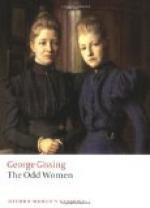Alice assented.
‘We must join to buy it, dear,’ she added, with anxious look. ’It wouldn’t be justifiable to spend more than two or three shillings.’
‘I fear not.’
They were preparing their midday meal, the substantial repast of the day. In a little saucepan on an oil cooking-stove was some plain rice, bubbling as Alice stirred it. Virginia fetched from downstairs (Mrs. Conisbee had assigned to them a shelf in her larder) bread, butter, cheese, a pot of preserve, and arranged the table (three feet by one and a half) at which they were accustomed to eat. The rice being ready, it was turned out in two proportions; made savoury with a little butter, pepper, and salt, it invited them to sit down.
As they had been out in the morning, the afternoon would be spent in domestic occupations. The low cane-chair Virginia had appropriated to her sister, because of the latter’s headaches and backaches, and other disorders; she herself sat on an ordinary chair of the bedside species, to which by this time she had become used. Their sewing, when they did any, was strictly indispensable; if nothing demanded the needle, both preferred a book. Alice, who had never been a student in the proper sense of the word, read for the twentieth time a few volumes in her possession—poetry, popular history, and half a dozen novels such as the average mother of children would have approved in the governess’s hands. With Virginia the case was somewhat different. Up to about her twenty-fourth year she had pursued one subject with a zeal limited only by her opportunities; study absolutely disinterested, seeing that she had never supposed it would increase her value as a ‘companion’, or enable her to take any better position. Her one intellectual desire was to know as much as possible about ecclesiastical history. Not in a spirit of fanaticism; she was devout, but in moderation, and never spoke bitterly on religious topics. The growth of the Christian Church, old sects and schisms, the Councils, affairs of Papal policy— these things had a very genuine interest for her; circumstances favouring, she might have become an erudite woman; But the conditions were so far from favourable that all she succeeded in doing was to undermine her health. Upon a sudden breakdown there followed mental lassitude, from which she never recovered. It being subsequently her duty to read novels aloud for the lady whom she ‘companioned,’ new novels at the rate of a volume a day, she lost all power of giving her mind to anything but the feebler fiction. Nowadays she procured such works from a lending library, on a subscription of a shilling a month. Ashamed at first to indulge this taste before Alice, she tried more solid literature, but this either sent her to sleep or induced headache. The feeble novels reappeared, and as Alice made no adverse comment, they soon came and went with the old regularity.
This afternoon the sisters were disposed for conversation. The same grave thought preoccupied both of them, and they soon made it their subject.




